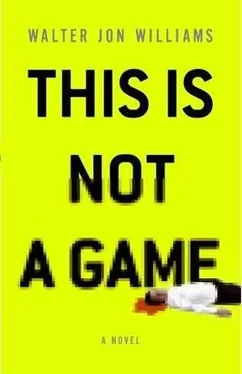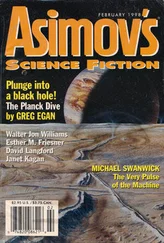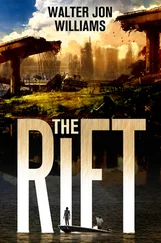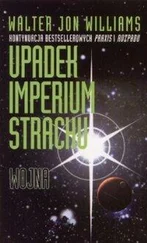Charlie shrugged again. “That’s over,” he said. “The central banks intervened, and so did the oil sheiks, to protect all their favorite boutiques.”
“You’d think the sheiks would want their Gucci cheaper.”
“Not if it means the Europeans are so poor they can’t buy petroleum.”
“Ah.” She sipped her tequila. “So who was leading the attack this time? ”
“I believe,” Charlie said carefully, “that the Chinese are getting the blame again.”
“Was it the Chinese? ”
“The Chinese were in the pack,” Charlie said, “but it was all really the fault of the French and the Germans. The euro is supported by this complicated agreement among the member communities that establishes various economic targets, like inflation. But the French and the Germans have been cheating since the beginning-they’re the largest economies over there, and they figured they could get away with it. But they left their currency vulnerable, and now they’ve paid the penalty. The euro’s down about thirty percent, last I checked.”
“How’s the dollar? ” she asked.
He lifted his eyebrows. “Knock wood,” he said.
Dagmar watched him as she sipped again at her drink.
“Was it the Russian Maffya that attacked the euro? ” she asked.
Charlie seemed to consider this.
“I doubt they’ve got enough capital to damage a major currency,” he said seriously. He took a large swallow of his Coke, reached for one of the white cardboard boxes piled at his feet. “I didn’t call you here to talk about this, anyway. I want you to take a look at one of these.”
He tossed her the box. The contents were light. She opened the box and took out a recharging unit and a device the size of her phone, covered in gray plastic. There was a small display, two buttons with Y and N on them, and a kind of clear plastic reservoir on one end, with a green plastic cap.
“What is it? ” she said. “A really stupid computer? ”
“It’s-well, you’d better use mine, I charged it last night.” He dug beneath the remaining papers on the couch, then produced an identical unit. He held down one of the buttons for a few seconds, and then the display lit.
“Go to the sink,” he said, “and fill the reservoir with tap water.”
She raised her eyebrows, but Charlie just looked at her. She took the unit and walked to the kitchen, then popped the bright green top and very carefully ran a little water into the reservoir.
“The unit is waterproof,” Charlie said. “You can submerge it if you like.”
“Do I put the cap back on? ”
“Yes. Then press the Yes button.”
When Dagmar pressed the button, nothing happened. Nothing visible, anyway. Then letters appeared on the display: DRINKING WATER?
“It’s asking if it’s drinking water.”
“Press the Yes button.”
Dagmar did so.
TRANSMIT? read the display.
“Do I want to transmit? ” Dagmar asked.
“Yes.”
Dagmar pressed the Yes button and waited another few seconds. Then the display read: TRANSMISSION COMPLETE.
“Okay,” she said. “That’s done.”
“Right. Empty out the reservoir, then bring the unit back.”
Dagmar did as she was requested, then sat on the couch and gave the unit back to Charlie.
“What we have here,” he said, tossing the unit lightly in one hand, “is a portable water-analysis device combined with a GPS and a satellite transmitter. It’s a civilian offshoot of technology developed for Homeland Security types to identify biological and chemical threats. Within a few seconds, the scanner can analyze water for any of hundreds of common and uncommon pollutants, including bioforms, then transmit the results to a central database, along with GPS coordinates.”
“Interesting,” Dagmar said. Warily, because she had a feeling she knew where Charlie was heading with this.
“Interesting, hell!” Charlie said. “It’s brilliant! Pass out enough of these things, and you can analyze every body of water on the planet, including every source of drinking water. You end up with a complete database of available water sources. Right now, we just added a new entry for tap water in this cabana.”
Dagmar sipped her drink. Tequila fumes flamed up her sinus.
Charlie held up a USB cable. “When you get one of these units,” he said, “you connect it to your computer with the cable, and you get an account with a company up in Portland called Tapping the Source. When you log on, you can read any data that you sent them yourself, so you’ll always know if your own drinking water is safe. But if you want access to the whole database-which a lot of people will-you have to pay a fee.”
Dagmar nodded. “A model of responsible environmental capitalism,” she said.
“Yeah. That’s why I like them.” He looked at her. “That’s why I want you to build these units into the game.”
She had, of course, been expecting something like this. Charlie had no reason to invite her to his cabana other than to screw with her work. But even though she had anticipated him, she still felt the shock, as if he’d just punched her in the ribs.
“Why not the next game, Charlie? ” she said. “I’m already up to my neck in rewrites.”
He shook his head.
“No,” he said. “This game.”
Dagmar feigned a patience she didn’t feel. “Charlie,” she said, “we’re in week three of an eight-week game. The last two weeks aren’t even written, and I’m still doing rewrites caused by the last piece of technology you wanted me to include in the game.”
“It’s not going to be that hard,” Charlie assured her.
She gave him a cold stare. “Uh-huh.”
She was tired of explaining about writing to people who didn’t write and didn’t know how to write.
“Look,” Charlie said, “your bad guys, the ones meeting in Planet Nine, are terrorists, right? ”
“Yeah.”
“And what sort of terror are they up to? ”
“Dirty bombs in major cities.”
Brussels, London, New York, Charleston, Delhi, Seattle, and San Diego. So that the players could each be sent on errands that would uncover important clues to the terrorists’ identities.
“Right,” Charlie said. “So instead of nuclear terrorism, make it chemical or biological. They’re contaminating water supplies. And they’re doing it in-for example-the fifty cities where we have the largest concentration of players.”
“Fifty? ” Outrage burned in her blood. “You’re going to ask the players to test the water reservoirs of fifty major cities, and do it without getting arrested or-”
Charlie shook his head. “It doesn’t have to be reservoirs, or even tap water. It could be lakes, creeks, ponds. Public fountains, even.”
“And what are they testing for? We can’t actually contaminate all these bodies of water.”
Charlie held up his unit. “These babies analyze the water down to parts per billion. You put a tiny amount of some neutral chemical in the water-something that won’t hurt anyone but will show up in the scans. Tell the players that the terrorists are testing their delivery systems before they use the real thing.”
“Charlie!” Dagmar said. “Now I have to find a person in each of fifty cities who can put this chemical into a body of water, and do it without being noticed!”
“There are go-to guys in every city,” Charlie said. “We just have to find the right-”
“Are you crazy? ” Dagmar demanded. “We don’t have the personnel to do this! We don’t have the budget! The technical staff doesn’t have the resources. We’d have to reshoot video and rerecord audio. And I don’t have enough time to do the rewrites.” She glared at him. “Plus, the players are going to revolt if they have to buy anything new. How much do those units cost? ”
Читать дальше











